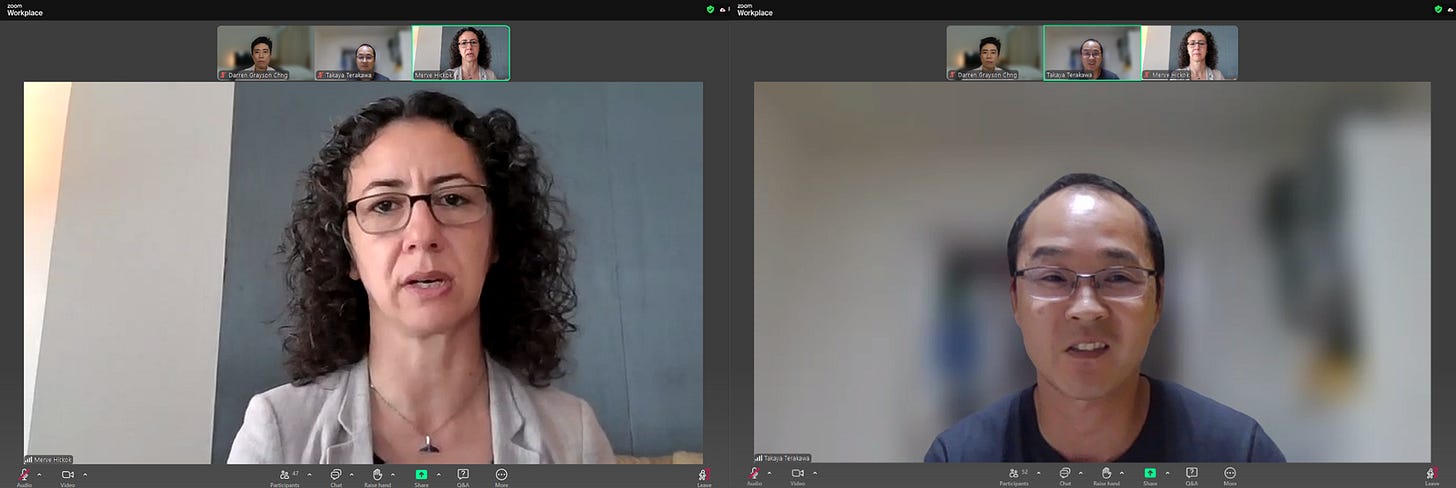[IAPP Web Conference] From global principles to APAC practice: Governing AI responsibly
Earlier this week on 25 June, Merve Hickok, Takaya Terakawa and I spoke on an IAPP web conference titled ‘From global principles to APAC practice: Governing AI responsibly’.
I was really delighted that Merve had agreed to participate in the panel discussion with Takaya and me because (1) she is a global expert on AI policy, ethics, and governance, (2) I think APAC is in need of fresh and more diverse perspectives in relation to AI policy and governance (and I also welcomed Takaya’s take here), and (3) Merve is currently a Visiting Researcher on AI at the Chiba Institute of Technology - Henkaku Center, Japan, and so is no stranger to Asian culture.
Here’s a summary of what I shared.
#1. APAC is not monolithic in terms of laws and development, and we have a patchwork. But we have some shared ambitions and values, and there are some common threads, for example:
A shared interest in AI for growth and trusted AI.
We are influenced by global principles like the OECD AI Principles, the UNESCO Recommendation on the Ethics of AI, and the Hiroshima AI Process.
There is increasing interest in cross-border alignment, which is evident to me from the ASEAN Guide on AI Governance and Ethics, and G7 discussions
We have similar interests in certain concepts like human centricity, transparency, and risk-based governance
#2. With this, there is convergence shaping up in some areas. I see this through:
Multilateral initiatives like the ASEAN Guide on AI Governance and Ethics, which was released in early 2024 and endorsed by all 10 ASEAN Member States: Brunei, Cambodia, Indonesia, Laos, Malaysia, Myanmar, Philippines, Thailand, and Vietnam.
If you’ve ever negotiated trade agreements, you’ll know that there are so many different views from the different countries on how things should be done and worded, and even the meaning of a single word. It can take so long just to come to an agreement on the trade agreement. So the fact that 10 countries agreed on this Guide is an amazing achievement.
Bilateral collaborations like the Singapore-Japan Joint Testing Report evaluating the safety of LLMs across linguistic environments.
#3. Singapore has been at the forefront of practical AI governance. Its Model AI Governance Framework, which was first released in 2019, established Singapore as a leader in voluntary, principles-based AI governance.
It attempts to turn global principles like fairness, transparency, accountability, into practical steps that companies can take to implement them. And then in 2022, Singapore created a self-assessment and testing toolkit, AI Verify, to enable companies to demonstrate accountability and responsible AI practices.
#4. Just these two projects already reflect some parts of Singapore’s approach to AI regulation - Singapore is pragmatic and focuses on practical guidance, and Singapore does not rush to regulate but takes an incremental and principles-based approach to AI governance.
#5. What is Singapore’s influence on the region? The ASEAN Guide is clearly influenced by Singapore’s Model AI Framework, and actually Singapore had led the development of the Guide.
While the Guide is not binding, I think it serves as regulatory convergence in a diverse group of countries with different legal systems and regulatory cultures, and at different stages of economic development. So the Guide may not be law, but if you want to develop AI in ASEAN, the Guide illustrates what the different governments’ thoughts on AI governance.




